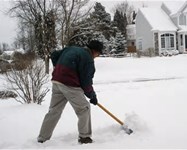Be careful in cold weather, which makes heart attacks, strokes and blood clots more likely; also, watch out for holiday stress

Heart attacks are 30 percent more likely during winter because of the weather, but there are precautions you can take to reduce your risk.
“The
winter months can put even a healthy person at risk for a heart attack or other
heart health problems,” said Dr. Suresh Sharma of KentuckyOne Health Cardiology
Associates in Lexington. “To help protect yourself and those around you, be
aware of the warning signs of heart attack, which include pressure, tightness
or pain in the chest or arms, nausea, shortness of breath, cold sweat,
lightheadedness and fatigue.”
winter months can put even a healthy person at risk for a heart attack or other
heart health problems,” said Dr. Suresh Sharma of KentuckyOne Health Cardiology
Associates in Lexington. “To help protect yourself and those around you, be
aware of the warning signs of heart attack, which include pressure, tightness
or pain in the chest or arms, nausea, shortness of breath, cold sweat,
lightheadedness and fatigue.”
Very
cold weather can increase heart rate and blood pressure, and cause blood vessels to narrow, requiring more pressure
to force blood through narrowed veins and arteries, increasing your risk of having a heart attack or
stroke.
cold weather can increase heart rate and blood pressure, and cause blood vessels to narrow, requiring more pressure
to force blood through narrowed veins and arteries, increasing your risk of having a heart attack or
stroke.
 |
| Shoveling snow can be risky. |
Shoveling snow or exercising in the cold can also cause blood vessels to narrow and raise blood pressure. “Your heart also has to
work much harder to keep your body warm in the cold,” a KentuckyOne news release says. “With heart rate and blood
pressure already elevated due to the low temperatures, this can cause blood
clots to form and provoke coronary artery spasms. . . . When shoveling snow or exercising outdoors, remember to dress warmly to keep your blood flowing, and warm up your muscles prior to doing physical activity. Do not drink alcohol before or immediately after shoveling snow, as this can increase your risk for heart attack.”
work much harder to keep your body warm in the cold,” a KentuckyOne news release says. “With heart rate and blood
pressure already elevated due to the low temperatures, this can cause blood
clots to form and provoke coronary artery spasms. . . . When shoveling snow or exercising outdoors, remember to dress warmly to keep your blood flowing, and warm up your muscles prior to doing physical activity. Do not drink alcohol before or immediately after shoveling snow, as this can increase your risk for heart attack.”
Stress related to the holidays “can also lead to heart problems,” the release says. “People who display symptoms of
heart-related illnesses might delay getting treatment because they don’t want
to disrupt holiday festivities. Or, holiday travelers might take longer to find
medical care away from home, which heightens the risk.
heart-related illnesses might delay getting treatment because they don’t want
to disrupt holiday festivities. Or, holiday travelers might take longer to find
medical care away from home, which heightens the risk.
“Overindulgence
during the holidays can also put your heart in danger. At family gatherings and
holiday parties, people tend to consume alcohol and eat more than usual,
including unhealthy foods that are high in sodium. Busy schedules due to
holiday engagements cause people to neglect their exercise routines, which can
put even more strain on the heart.”
during the holidays can also put your heart in danger. At family gatherings and
holiday parties, people tend to consume alcohol and eat more than usual,
including unhealthy foods that are high in sodium. Busy schedules due to
holiday engagements cause people to neglect their exercise routines, which can
put even more strain on the heart.”
Sharma says, “Many
people let their health take a backseat during the winter, but it’s actually
even more important to ensure your heart is healthy during the colder months. Try to maintain a healthy lifestyle throughout the holiday
season, and talk to your primary care provider about ways to protect your heart
during the colder months.”
people let their health take a backseat during the winter, but it’s actually
even more important to ensure your heart is healthy during the colder months. Try to maintain a healthy lifestyle throughout the holiday
season, and talk to your primary care provider about ways to protect your heart
during the colder months.”
The release says, “If
you or someone near you is presenting symptoms of a heart attack, call 911
immediately. Then, if you are able, perform hands-only CPR by placing your
hands on the victim’s chest and administering compressions hard and fast, 100
times per minute, in the center of the chest. Don’t stop until help arrives.” For more about heart-disease risk factors, or to take a heart-health risk assessment, visit www.kentuckyonehealth.org/heart-disease-risk-factors.
you or someone near you is presenting symptoms of a heart attack, call 911
immediately. Then, if you are able, perform hands-only CPR by placing your
hands on the victim’s chest and administering compressions hard and fast, 100
times per minute, in the center of the chest. Don’t stop until help arrives.” For more about heart-disease risk factors, or to take a heart-health risk assessment, visit www.kentuckyonehealth.org/heart-disease-risk-factors.